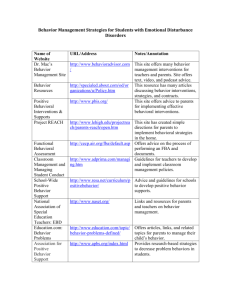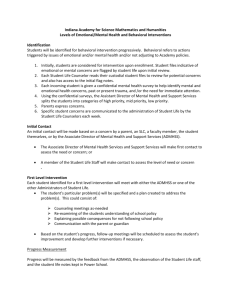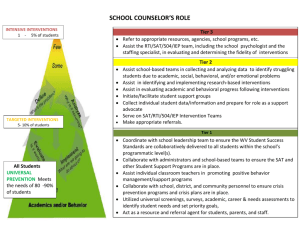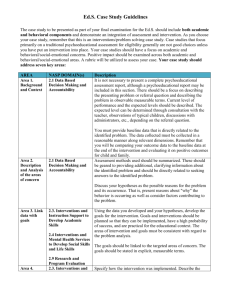DCYF Desk Reference Over 4
advertisement
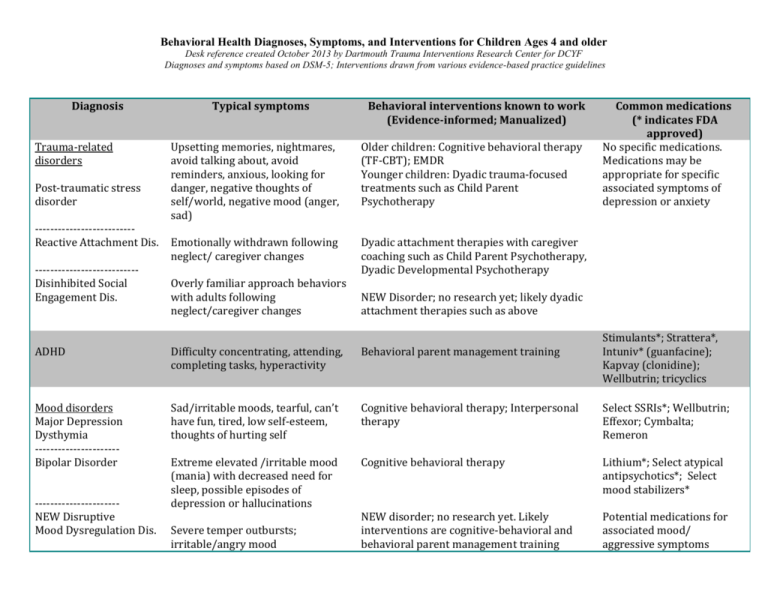
Behavioral Health Diagnoses, Symptoms, and Interventions for Children Ages 4 and older Desk reference created October 2013 by Dartmouth Trauma Interventions Research Center for DCYF Diagnoses and symptoms based on DSM-5; Interventions drawn from various evidence-based practice guidelines Diagnosis Trauma-related disorders Post-traumatic stress disorder -------------------------Reactive Attachment Dis. --------------------------Disinhibited Social Engagement Dis. Typical symptoms Behavioral interventions known to work (Evidence-informed; Manualized) Upsetting memories, nightmares, avoid talking about, avoid reminders, anxious, looking for danger, negative thoughts of self/world, negative mood (anger, sad) Older children: Cognitive behavioral therapy (TF-CBT); EMDR Younger children: Dyadic trauma-focused treatments such as Child Parent Psychotherapy Emotionally withdrawn following neglect/ caregiver changes Dyadic attachment therapies with caregiver coaching such as Child Parent Psychotherapy, Dyadic Developmental Psychotherapy Overly familiar approach behaviors with adults following neglect/caregiver changes Common medications (* indicates FDA approved) No specific medications. Medications may be appropriate for specific associated symptoms of depression or anxiety NEW Disorder; no research yet; likely dyadic attachment therapies such as above Stimulants*; Strattera*, Intuniv* (guanfacine); Kapvay (clonidine); Wellbutrin; tricyclics ADHD Difficulty concentrating, attending, completing tasks, hyperactivity Behavioral parent management training Mood disorders Major Depression Dysthymia ---------------------Bipolar Disorder Sad/irritable moods, tearful, can’t have fun, tired, low self-esteem, thoughts of hurting self Cognitive behavioral therapy; Interpersonal therapy Select SSRIs*; Wellbutrin; Effexor; Cymbalta; Remeron Extreme elevated /irritable mood (mania) with decreased need for sleep, possible episodes of depression or hallucinations Cognitive behavioral therapy Lithium*; Select atypical antipsychotics*; Select mood stabilizers* NEW disorder; no research yet. Likely interventions are cognitive-behavioral and behavioral parent management training Potential medications for associated mood/ aggressive symptoms ---------------------NEW Disruptive Mood Dysregulation Dis. Severe temper outbursts; irritable/angry mood Behavioral Health Diagnoses, Symptoms, and Interventions for Children Ages 4 and older Desk reference created October 2013 by Dartmouth Trauma Interventions Research Center for DCYF Diagnoses and symptoms based on DSM-5; Interventions drawn from various evidence-based practice guidelines Behavioral disorders Oppositional Defiant Dis. Disruptive Behavior Dis. Conduct Dis. Non-compliant, oppositional angry mood, vindictive, aggressive behaviors Behavioral parent management training (Triple P; HNC; PCIT); Multisystemic therapy Potential medications for associated mood/ aggression/ADHD Anxiety disorders Generalized, Social, Panic, Separation Anxiety Obsessive Compulsive Disorders (OCD, Hair pulling) -------------------------Tic Disorders Excessive fears, worries, physical symptoms, restless Cognitive-behavioral therapy (e.g., Coping Cat) Select SSRIs (antidepressants); buspirone Obsessive, unwanted thoughts/urges and/or repetitive behaviors to reduce anxiety Cognitive-behavioral therapy (exposure and response prevention) Anafranil*; Luvox*; Zoloft* Vocal or motor tics; odd repetitive motor behaviors Habit reversal Autism Spectrum Autism, Aspergers, Pervasive Developmental Disorder Social communication and interaction deficits; restricted behavior/interests Applied Behavioral Analysis parent training Behavioral parent management training; Social Thinking Clonidine, Guanfacine, Orap*, Atypical and traditional antipsychotics For aggressive behaviors, select atypical antipsychotics* Thought disorders Schizophrenia Psychotic Disorder Delusions, hallucinations, disorganized speech or behavior Cognitive behavioral therapy Select atypical and traditional antipsychotics* NOTE: The list of behavioral interventions and medications is suggestive but not exhaustive. Some interventions may not be available everywhere. Clinical judgment is needed for each child and family when choosing interventions. Age and developmental level of the child are important, and many children have more than one diagnosis. In some cases, both behavioral interventions and medications are indicated. This desk reference is relevant to children ages 4 years and older. Behavioral Health Diagnoses, Symptoms, and Interventions for Children Ages 4 and older Desk reference created October 2013 by Dartmouth Trauma Interventions Research Center for DCYF Diagnoses and symptoms based on DSM-5; Interventions drawn from various evidence-based practice guidelines Psychotropic medications and side effects Stimulants (e.g., Adderral, Ritalin, Concerta): headache, trouble sleeping, stomachaches, loss of appetite, weight loss. Rare: Tics (twitching of the face, blinking or throat clearing, biting finger nails), increased irritability or excitability, decreased growth (possibly an inch over 3-8 years). Please tell your doctor if your child has relatives under 50 who have died of heart problems, or your child has a history of irregular heartbeats, heart murmurs, fainting spells, chest pain, or structural heart problems. Strattera (non-stimulant for ADHD): sleepiness or insomnia, appetite loss, weight loss, nausea, stomachaches. Rare: eyes and/or skin turning yellow or changes in urine color (related to inflammation of the liver), trouble urinating, or worsening moods. The U.S. Food & Drug Association has included a “black box” warning that Strattera may increase suicidal thoughts and behaviors. Antidepressants (SSRIs, SNRIs; e.g., Prozac): headache, dizziness, stomachaches, nausea, loose stools or diarrhea, dry mouth, weight gain or loss (mild), sleepiness or insomnia. Rare: Feeling excited, irritable or more depressed. The U.S. Food and Drug Administration has put out a “black box” warning that antidepressants may increase suicidal thoughts and behaviors (about 4% of the time). Atypical Antipsychotics (e.g., Seroquel, Risperdal)/Second Generation Antipsychotics (e.g., Haldol): sleepiness, dizziness, increased appetite, weight gain with increased cholesterol, muscle stiffness, tremors (shakiness). Rare: After many years of use of these medications can lead to being overweight, high blood pressure and risk of diabetes or high blood sugar and some may develop a twitching of the face, tongue, arms or legs called tardive dyskinesia that may not always go away when the medication is stopped. Your child needs to be regularly examined (weight, blood pressure) and have regular blood tests. In extremely rare cases, these medications my cause muscle stiffness and high fevers that can be fatal. Lithium: sleepiness, tremors, weight gain, increased or decreased urination, increased thirst, worsening of acne, loose stools or diarrhea Rare: Thyroid or kidney problems, irregular heartbeat, confusion, brain injury if blood level goes to high, clumsiness and dizziness. Regular blood tests are needed to check for problems and to be sure the blood level of lithium is right. Depakote, Tegretol, Lamictal, Trileptal: sleepiness, tremors, weight gain. Rare: liver or pancreas problems, dizziness, confusion, changes in blood cell and platelet numbers, changes in vision, severe skin rash, and birth defects if taken when pregnant. Lamictal or Tegretol can cause a severe, possibly deadly allergic reaction where the skin blisters and falls off or the white blood cell count goes very low. Please let the doctor know if there are any new rashes or changes of the skin. Regular blood tests are needed to check for problems and to be sure the blood level of the medicine is right. Guanfacine, Clonidine: sleepiness, low blood pressure, dizziness, dry mouth, dry eyes, blurry vision, headache, weakness, and decreased heart rate. If your child has been taking this medication and suddenly stops it, his/her blood pressure can go up very high. If the medication needs to be stopped, you should discuss with your doctor how to go off this safely.
